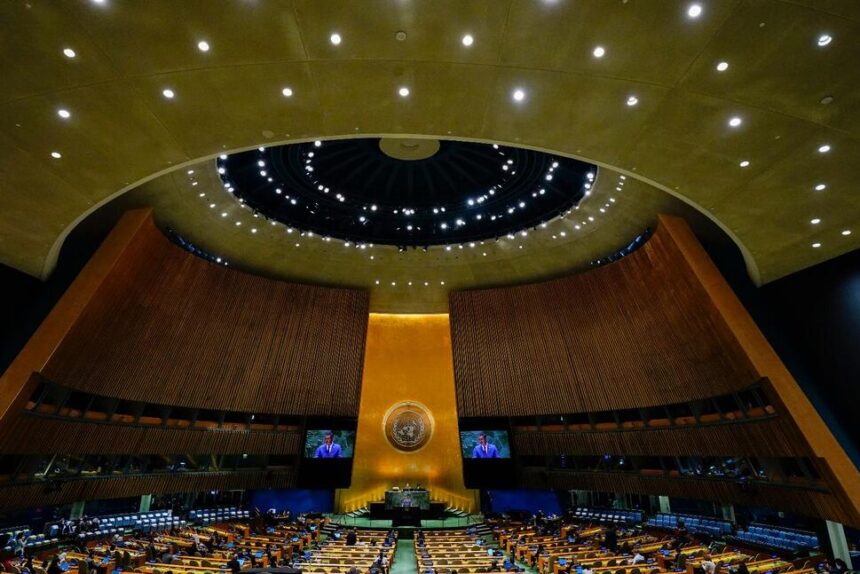UNITED NATIONS (AP) — Just a few years ago, artificial intelligence was barely mentioned when world leaders convened the United Nations General Assembly.
Presidents, prime ministers, monarchs and ministers have gathered as governments at different levels are considering or have already adopted regulations on AI. Industry heavyweights recognize that guardrails are necessary, but want to protect the expected benefits of the technology. Outsiders and even some insiders warn that there are also potentially catastrophic risks, and everyone says there is no time to lose.
And many eyes are on the UN, which may be the only place to tackle this problem on a large scale.
The global body has unique strengths to offer, including unmatched scale and a history of negotiating pacts on global issues, and it is set to launch an AI advisory council this fall.
“Having convergence, a common understanding of risks, that would be a very important outcome,” the UN technology policy chief said. Amandeep Gill said in an interview. He added that it would be very useful to reach a common understanding on the type of governance that works, or could, to minimize risks and maximize positive opportunities.
A CONVERSATION THAT GAINS MOMENTUM
As recently as 2017, only three speakers discussed AI during the equivalent of an assembly main stage, the “ General debate.” This year, more than 20 speakers did so, representing countries from Namibia to North Macedonia, from Argentina to East Timor.
Secretary-General António Guterres announced plans this month to appoint members of the advisory council, with preliminary recommendations expected by the end of the year — lightning speed, by U.N. standards.
Lesotho Prime Minister Sam Matekane raised concerns about threats to privacy and security, Nepalese Prime Minister Pushpa Kamal Dahal about the potential misuse of AI, and Icelandic Foreign Minister Thórdís Kolbrún R. Gylfadóttir about technology “becoming a tool of destruction”. Britain promoted its upcoming “AI Security Summit” while Spain presented itself as an enthusiastic host for a potential international agency for AI and Israel touted its technological strengths as a potential developer of useful AI.
Days after US senators discussed AI behind closed doors Along with tech bigwigs and skeptics, President Joe Biden said Washington is working “to make sure that we govern this technology — not the other way around, that it governs us.”
And with the General Assembly as the center of gravity, there were so many AI policy roundtables and meetings around New York last week that attendees sometimes rushed from one to one. other.
“The most important meetings we hold are those at the UN, because it is the only inclusive body that brings us all together here,” said Omar Al-Olama, President of the United Arab Emirates. minister of artificial intelligence, said at a UN-sponsored event attended by four senior officials from various countries. It generated so much interest that half a dozen of their counterparts commented.
Players from the technology industry also made sure to be present during the big UN week.
“What’s really encouraging is that there is so much global interest in finding a solution to this problem – and the UN is in a position to help harmonize all the conversations” and work to ensure that all voices are heard, said James Manyika, senior vice president of Google. The tech giant helped develop a new UN based on artificial intelligence site to search for data and track progress against the global body’s key goals.
MANY PEOPLE ARE TALKING, BUT MAYBE A SLOW PROCESS
But while the United Nations has its advantages, it also has the challenges of a consensus-seeking philosophy that often moves slowly. Moreover, its members are governments, while AI is driven by a set of private companies.
Still, a global issue needs a global forum, and “the U.N. is absolutely a place to have these conversations,” says Ian Bremmer, president of the Eurasia Group, a political risk consulting firm.
Even though governments aren’t developers, Gill notes that they can “influence the direction AI takes.”
“It is not only about regulating against abuse and harm, ensuring that democracy and the rule of law are not compromised, but it is also about promoting a diverse and inclusive” and to encourage public investments in research and workforce training where they exist. There aren’t many deep-pocketed tech companies doing this, he said.
The United Nations will have to navigate territory that certain governments and national blocs, including the European Union and the Group of 20 Industrialized nations are already embarking on summits, declarations and, in some cases, regulations of their own.
Ideas differ on what a potential global body on AI should be: perhaps a fact-finding and assessment group, similar to the Intergovernmental Panel on Evolution of AI. climate, or a monitoring body like the International Atomic Energy Agency? A normative entity similar to the UN maritime and civil aviation agencies? Or something else?
There is also the question of how to generate innovation and hoped-for breakthroughs – in medicine, disaster prediction, energy efficiency and much more – without exacerbating inequalities and misinformation or, worse yet, enabling the catastrophe of runaway robots. This science fiction scenario started to seem a lot less far-fetched when hundreds of technology leaders and scientists, including the CEO of ChatGPT maker OpenAI, issued a warning in May about “the risk of extinction due to AI.”.”
An OpenAI manager who became a competitor then told the UN Security Council in July that artificial intelligence poses “potential threats to international peace, security and stability” due to its unpredictability and possible misuse.
However, there are clearly divergent views on the distribution of risks and opportunities.
“For countries like Nigeria and the Global South, the biggest problem is: what are we going to do with this amazing technology? Will we have the opportunity to use it to lift our people and our economies equally and at the same pace as the West? asked Nigerian Communications Minister Olatunbosun Tijani during a discussion on AI hosted by the New York Public Library. He suggested that “even the debate on governance has been driven from the West”.
Chilean Science Minister Aisén Etcheverry believes that AI could enable a digital transition, an opportunity to narrow the gaps that previous technologies have opened in access, inclusion and wealth.
A COMPLEX PATH, BUT WITH CLEAR ADVANTAGES
But it will take more than just improving telecommunications infrastructure. Countries that have been left behind before must have “the language, the culture, the different histories that we come from, represented in the development of artificial intelligence,” Etcheverry said at the UN-sponsored side event .
Gill, originally from India, shares these concerns. The dialogue on AI must expand beyond a “promise and peril” dichotomy to reach “a more nuanced understanding where access to opportunities, and its empowerment dimension… is also at the forefront”, did he declare.
Even before the UN advisory council established a detailed agenda, many suggestions were put forward during conversations around the General Assembly. Working on global minimum standards for AI. Align different regulatory and enforcement efforts across the globe. Consider setting up AI registries, validation and certification. Focus on regulating uses rather than the technology itself. Develop a “rapid response mechanism” in case feared possibilities materialize.
From Dr. Rose Nakasi’s perspective, however, the benefits of AI were clear.
The Ugandan computer scientist and his colleagues at Makerere University’s AI lab are using the technology to streamline microscopic analysis of blood samples, the gold standard method for diagnosing malaria.
Their work is aimed at countries that lack pathologists, particularly in rural areas. A magnifying eyepiece, produced by 3D printing, fits cell phone cameras and takes photos of microscope slides; AI image analysis then detects and identifies pathogens. Google’s charitable arm recently donated $1.5 million to the lab.
AI is “an enabler” of human activity, Nakasi said between attending General Assembly-related events.
“We can’t let him do it alone,” she said. “But once it’s well regulated, where we have it as a supporting tool, I think it can do a lot. »
Copyright 2023 The Associated Press. All rights reserved. This material may not be published, broadcast, rewritten or redistributed.












